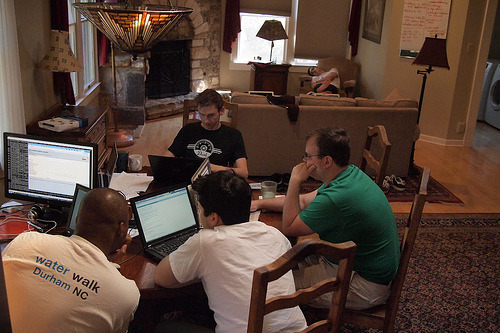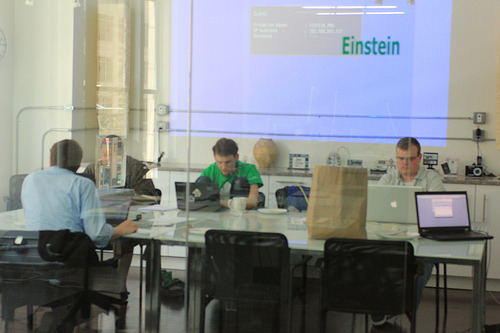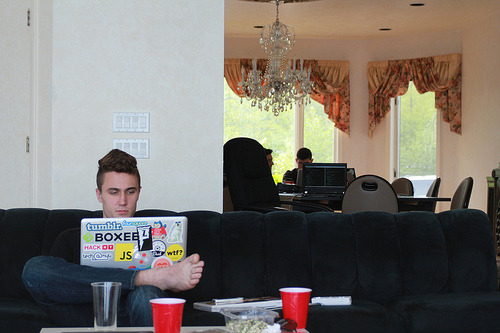Hackathoning
864 cans of soda, 40 boxes of pizza, 200 burritos, and a room full of student hackers, prolific and talented coders ready to work for New York City’s next big startup. It’s hackNY’s spring 2012 student hackathon. Emmett Butler and Zach Cimafonte, two of Parse.ly’s crack engineers, attended with the Dash API. “Zach and I prepared an early version of our Extract API, a simple entity-extraction service, in addition to making a large amount of our collected publisher data available to the hackers via a search engine,” Emmett, a 2012 hackNY Fellow and NYU student, says, which sounds complicated and intimidating to a comp sci novitiate like myself. Emmett would not likely admit as much. A mistake in his task management program instructed him to write 225,000 lines of code this week. The program reported that last week he wrote 2,000,000. “Is that a lot of code?” someone asked, and Emmett laughed. “Get at me bro.” Instant office meme.
In “Hackathons Aren’t Just for Hacking,” Alyson Krueger writes for Wired about how hackathons—a “brainstorm and software-coding party”—are increasingly responsive to sales, marketing, and HR objectives. Krueger lists four ways tech startups use hackathons: to lure new employees with perks and a cool company culture, to make an impact on public opinion, to outsource research-and-development, and just to have a good time. Parse.ly engineers and developers participate in hackathons regularly, oftentimes for a fifth reason: to stay engaged in the New York startup community. The collaborative nature of multi-company hackathons offers coders an opportunity to hone their skills, pick up new tricks, socialize with colleagues, and scout out new trends.
“I woke up on the morning of the presentations to a flurry of confused tweets from the hackers wondering why our service wasn’t working (or requesting higher rate limits!). I managed to frantically bring it back up in time for the teams to finish their work – it was just unexpected that so many people would use the service we put together,” Emmett says. Even though I wasn’t there, I can sense the infectious excitement of a late night coding session. The hacking community, however insular and esoteric, seems friendly and gracious. A genuine goodwill inflects these hackathons; they demonstrate how business and (continuing) education can converge in productive patterns. Projects don’t need to be fundable or profitable, but the more impressive, the better. One Parse.ly-based hack, “Essay Beefer,” took an incomplete essay and finished it off with quotations and cites. Such a program comes as no surprise from a room full of college students.
If hackathons are turning into the blunt instruments of business, they have retained a certain anarchic, communal flair. Overt competition can be rerouted into collaboration, permitting sometimes rivals to come together over a shared API, for instance. More than a deal making bonanza, the “hackathon” appears, at least to an outsider like myself, as a kind of collective effort towards community building.
Hackathons at Parse.ly are intensely collaborative as well and a key component of product development. Here are some pictures from past company hackathons:


